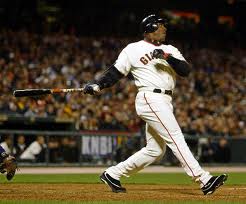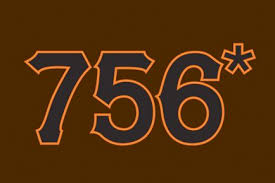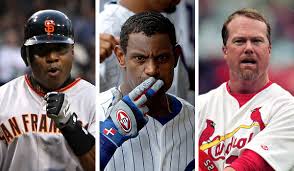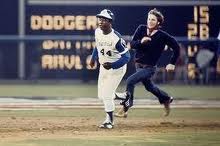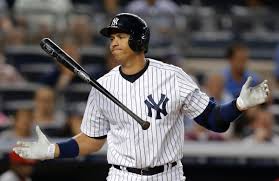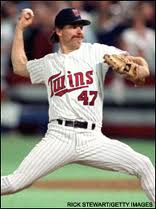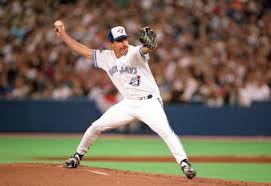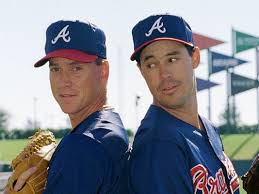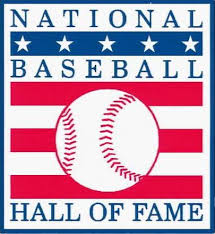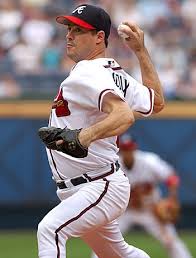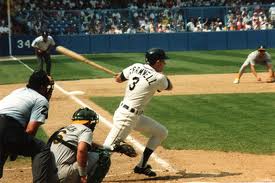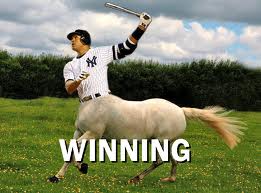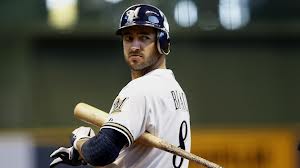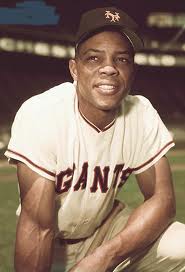The 2016 MLB Hall of Fame class is another group that could lead to an overflowing crowd of supporters in Cooperstown, New York next summer. After watching Randy Johnson, Pedro Martinez, John Smoltz, and Craig Biggio give lengthy speeches last summer, it could (and should) be a much larger group of inductees, as the museum and its voting privileged try to come to grips with the reality in the backlog, logjam, and cluster&%$# of names, due to their own stupidity, has led to.
Luckily, many of the writers are becoming more credible by making their ballots public, which leads to the early favorite for the worst ballot: Earl Bloom, who is the only person to have publicly voted for Garret Anderson.
Of course, I was ridiculed publicly, and privately, for my own vote last season, after having said that David Ortiz is the greatest DH of all-time, and I will be redeeming myself with my vote this season and detailing why Edgar Martinez is that man. I have this wonderful opportunity due to the Internet Baseball Writers Association of America (IBWAA). Here is some free advertising:
The Internet Baseball Writers Association of America (IBWAA) was created July 4, 2009 to organize and promote the growing online baseball media, and to serve as a digital alternative to the Baseball Writers Association of America (BBWAA).
The IBWAA seeks neither to replace nor disparage the BBWAA, but does offer distinctions. While the BBWAA requires ten years and hundreds of dollars of paid membership for writers to earn a Hall of Fame vote, the IBWAA has no waiting period, with a $20 annual membership fee ($35 lifetime).
In the vast majority of cases, the BBWAA requires the tying of a writer’s online work to a print publication for admission; the IBWAA does not. The IBWAA believes that the hoops an applying writer has to jump through to join the older organization are too many and too narrow, and welcomes all Internet baseball writers. Those with his or her own baseball website of any kind or scope are invited to join, as are those who contribute the written word anywhere within the baseball blogosphere.
Enough of that. Below, you’ll see my 15 votes for the 2016 MLB Hall of Fame.
NOTE: Jeff Bagwell, Tim Raines, and Mike Piazza were elected by the IBWAA and do not appear on the list for that reason.
The all-time home run king (asterisk if you’d like) was the most feared hitter of his era, and possibly of all-time when you consider his career intentional walks, also a MLB record. He juiced…so did most of the top players. Say what you want about integrity of the game, but Bonds still had to hit the ball, and he did it better than anyone else.
| Year | Age | Tm | Lg | G | PA | AB | R | H | 2B | 3B | HR | RBI | SB | BB | SO | TB | IBB | ||||
|---|---|---|---|---|---|---|---|---|---|---|---|---|---|---|---|---|---|---|---|---|---|
| 22 Yrs | 2986 | 12606 | 9847 | 2227 | 2935 | 601 | 77 | 762 | 1996 | 514 | 2558 | 1539 | .298 | .444 | .607 | 1.051 | 5976 | 688 | |||
| 162 Game Avg. | 162 | 684 | 534 | 121 | 159 | 33 | 4 | 41 | 108 | 28 | 139 | 83 | .298 | .444 | .607 | 1.051 | 324 | 37 | |||
Another “juicer” who prolonged his career with the help of medicine, Clemens was a workaholic well before the steroids became his enhancer. The career that Clemens had is Hall worthy, and he was a master of his craft and dominant during an era that was dominated by the juicing hitters.
| Year | W | L | G | CG | SHO | IP | H | R | ER | HR | BB | SO | ||||||||
|---|---|---|---|---|---|---|---|---|---|---|---|---|---|---|---|---|---|---|---|---|
| 24 Yrs | 354 | 184 | 3.12 | 709 | 118 | 46 | 4916.2 | 4185 | 1885 | 1707 | 363 | 1580 | 4672 | 143 | 3.09 | 1.173 | 7.7 | 2.9 | 8.6 | 2.96 |
| 162 Game Avg. | 17 | 9 | 3.12 | 34 | 6 | 2 | 236 | 201 | 91 | 82 | 17 | 76 | 224 | 143 | 3.09 | 1.173 | 7.7 | 2.9 | 8.6 | 2.96 |
The smile, the swing, the glove…”The Kid”. Griffey has a clean image in a tarnished era. No one truly knows who was using and who wasn’t, but the assumption is that Griffey was the one who was doing it the right way. Injuries derailed his chance of holding Hank Aaron’s record that Bonds now has, but Junior certainly has a long-lasting legacy of greatness that will, quite possibly, earn him the highest Hall vote in history.
| Year | G | PA | AB | R | H | 2B | 3B | HR | RBI | SB | BB | SO | TB | IBB | |||||
|---|---|---|---|---|---|---|---|---|---|---|---|---|---|---|---|---|---|---|---|
| 22 Yrs | 2671 | 11304 | 9801 | 1662 | 2781 | 524 | 38 | 630 | 1836 | 184 | 1312 | 1779 | .284 | .370 | .538 | .907 | 136 | 5271 | 246 |
| 162 Game Avg. | 162 | 686 | 594 | 101 | 169 | 32 | 2 | 38 | 111 | 11 | 80 | 108 | .284 | .370 | .538 | .907 | 136 | 320 | 15 |
Hoffman and his changeup held the record for all-time saves until Mariano Rivera and his cutter took it away shortly after his retirement. His long-term success and dominance help his case, even if he closed out his career in less-than-Rivera-fashion.
| Year | W | L | G | GF | SV | IP | H | R | ER | HR | BB | SO | ||||||||
|---|---|---|---|---|---|---|---|---|---|---|---|---|---|---|---|---|---|---|---|---|
| 18 Yrs | 61 | 75 | 2.87 | 1035 | 856 | 601 | 1089.1 | 846 | 378 | 347 | 100 | 307 | 1133 | 141 | 3.08 | 1.058 | 7.0 | 2.5 | 9.4 | 3.69 |
| 162 Game Avg. | 4 | 5 | 2.87 | 68 | 56 | 39 | 72 | 56 | 25 | 23 | 7 | 20 | 74 | 141 | 3.08 | 1.058 | 7.0 | 2.5 | 9.4 | 3.69 |
Kent was similar in his success at the keystone position as Cubs’ great Ryne Sandberg. He may have been helped by having Bond hit in front of him for several seasons, but he still had to complete his job, and he did so tremendously. He was a force, a five-time All-Star, and an MVP. He didn’t have the defensive chops of Ryno, but the bat was much more impressive for a longer period of time.
| Year | G | PA | AB | R | H | 2B | 3B | HR | RBI | SB | BB | SO | TB | IBB | |||||
|---|---|---|---|---|---|---|---|---|---|---|---|---|---|---|---|---|---|---|---|
| 17 Yrs | 2298 | 9537 | 8498 | 1320 | 2461 | 560 | 47 | 377 | 1518 | 94 | 801 | 1522 | .290 | .356 | .500 | .855 | 123 | 4246 | 61 |
| 162 Game Avg. | 162 | 672 | 599 | 93 | 173 | 39 | 3 | 27 | 107 | 7 | 56 | 107 | .290 | .356 | .500 | .855 | 123 | 299 | 4 |
The greatest DH of all-time. Edgar at his peak was a monster, earning a 39.8 WAR from 1995-2001 while playing all of 33.1 innings over seven games in the field. Add in his impressive WAR from 1990-1992 (17.2) while manning third base, and you can see that he was a pretty special player before moving to DH. Sure, he may not have the home run totals of David Ortiz, but he was a far superior player, especially his peak seasons.
| Year | G | PA | AB | R | H | 2B | 3B | HR | RBI | SB | BB | SO | TB | IBB | |||||
|---|---|---|---|---|---|---|---|---|---|---|---|---|---|---|---|---|---|---|---|
| 18 Yrs | 2055 | 8674 | 7213 | 1219 | 2247 | 514 | 15 | 309 | 1261 | 49 | 1283 | 1202 | .312 | .418 | .515 | .933 | 147 | 3718 | 113 |
| 162 Game Avg. | 162 | 684 | 569 | 96 | 177 | 41 | 1 | 24 | 99 | 4 | 101 | 95 | .312 | .418 | .515 | .933 | 147 | 293 | 9 |
“The Crime Dog” was a monster for several clubs, and his constant changing of teams makes him an intriguing case for the Hall, as he didn’t spend more than five years with any team over his 19 seasons. Additionally, he fell just short of the once-impressive 500 home run club. When you consider his career stats are most similar to Hall of Famers like Willie McCovey, Willie Stargell, and Frank Thomas, you can see why McGriff belongs alongside his peers in Cooperstown, especially since he hasn’t been connected to any steroid stories.
| Year | G | PA | AB | R | H | 2B | 3B | HR | RBI | SB | BB | SO | TB | IBB | |||||
|---|---|---|---|---|---|---|---|---|---|---|---|---|---|---|---|---|---|---|---|
| 19 Yrs | 2460 | 10174 | 8757 | 1349 | 2490 | 441 | 24 | 493 | 1550 | 72 | 1305 | 1882 | .284 | .377 | .509 | .886 | 134 | 4458 | 171 |
| 162 Game Avg. | 162 | 670 | 577 | 89 | 164 | 29 | 2 | 32 | 102 | 5 | 86 | 124 | .284 | .377 | .509 | .886 | 134 | 294 | 11 |
McGwire helped save the game after the 1994 strike with his incredible home runs. He couldn’t stay healthy, and it could be due to all of the steroids in his system, but his numbers and production are just as valuable as the PED-based shoulders that carried the game back into some semblance of respectability – until the league decided to frown on the same things that lifted it up.
| Year | G | PA | AB | R | H | 2B | 3B | HR | RBI | SB | BB | SO | TB | IBB | |||||
|---|---|---|---|---|---|---|---|---|---|---|---|---|---|---|---|---|---|---|---|
| 16 Yrs | 1874 | 7660 | 6187 | 1167 | 1626 | 252 | 6 | 583 | 1414 | 12 | 1317 | 1596 | .263 | .394 | .588 | .982 | 163 | 3639 | 150 |
| 162 Game Avg. | 162 | 662 | 535 | 101 | 141 | 22 | 1 | 50 | 122 | 1 | 114 | 138 | .263 | .394 | .588 | .982 | 163 | 315 | 13 |
“Moose” was a workhorse and a winner for a team that never won in Baltimore. While he only won 20 games once (his final season), he was a model of consistency and won 117 more games than he lost due to his efforts.
| Year | W | L | G | GS | CG | SHO | IP | H | R | ER | HR | BB | SO | ||||||||
|---|---|---|---|---|---|---|---|---|---|---|---|---|---|---|---|---|---|---|---|---|---|
| 18 Yrs | 270 | 153 | 3.68 | 537 | 536 | 57 | 23 | 3562.2 | 3460 | 1559 | 1458 | 376 | 785 | 2813 | 123 | 3.57 | 1.192 | 8.7 | 2.0 | 7.1 | 3.58 |
| 162 Game Avg. | 17 | 10 | 3.68 | 34 | 34 | 4 | 1 | 226 | 219 | 99 | 92 | 24 | 50 | 178 | 123 | 3.57 | 1.192 | 8.7 | 2.0 | 7.1 | 3.58 |
The bat speed, the production, the attitude…Sheffield had it all. He, like McGriff, never found a long-term home. It doesn’t change the fact that his prime and peak seasons were seasons for the ages. He dominated the opposition and was feared for a long period of time. Who knows if he was a juicer – even if he was, he was one of the best players of the era.
| Year | G | PA | AB | R | H | 2B | 3B | HR | RBI | SB | BB | SO | TB | IBB | |||||
|---|---|---|---|---|---|---|---|---|---|---|---|---|---|---|---|---|---|---|---|
| 22 Yrs | 2576 | 10947 | 9217 | 1636 | 2689 | 467 | 27 | 509 | 1676 | 253 | 1475 | 1171 | .292 | .393 | .514 | .907 | 140 | 4737 | 130 |
| 162 Game Avg. | 162 | 688 | 580 | 103 | 169 | 29 | 2 | 32 | 105 | 16 | 93 | 74 | .292 | .393 | .514 | .907 | 140 | 298 | 8 |
Smith redefined the closer role and if the Hall has room for Bruce Sutter, it certainly has room for Smith for the same reason. It’s actually baffling that Smith, who has 178 more saves and a much longer, successful career, isn’t in and Sutter is…but that’s just my opinion.
| Year | W | L | G | GF | SV | IP | H | R | ER | HR | BB | SO | ||||||||
|---|---|---|---|---|---|---|---|---|---|---|---|---|---|---|---|---|---|---|---|---|
| 18 Yrs | 71 | 92 | 3.03 | 1022 | 802 | 478 | 1289.1 | 1133 | 475 | 434 | 89 | 486 | 1251 | 132 | 2.93 | 1.256 | 7.9 | 3.4 | 8.7 | 2.57 |
| 162 Game Avg. | 5 | 6 | 3.03 | 68 | 53 | 32 | 85 | 75 | 31 | 29 | 6 | 32 | 83 | 132 | 2.93 | 1.256 | 7.9 | 3.4 | 8.7 | 2.57 |
As mentioned above with McGwire, Sosa was loved by all during the home run barrage of the late 90s and early 2000s, but baseball turned their back on him and the other juicers once the Mitchell Report was released. Sure, he’s tainted, but he was an incredible talent whose love of the game and long tenure with the lovable losers in Chicago made him an easy person to root for. He has blemishes but so did MLB during his time. He deserves to be in Cooperstown.
| Year | G | PA | AB | R | H | 2B | 3B | HR | RBI | SB | BB | SO | TB | IBB | |||||
|---|---|---|---|---|---|---|---|---|---|---|---|---|---|---|---|---|---|---|---|
| 18 Yrs | 2354 | 9896 | 8813 | 1475 | 2408 | 379 | 45 | 609 | 1667 | 234 | 929 | 2306 | .273 | .344 | .534 | .878 | 128 | 4704 | 154 |
| 162 Game Avg. | 162 | 681 | 607 | 102 | 166 | 26 | 3 | 42 | 115 | 16 | 64 | 159 | .273 | .344 | .534 | .878 | 128 | 324 | 11 |
Trammell was ARod, Ripken, Larkin, Garciaparra, and Tejada before those guys happened. His ability to hit and field at shortstop helped lay the path for talented sluggers like Troy Tulowitzki and Carlos Correa today. Although Lou Whitaker will not ever get in the Hall, Trammell can still afford the dynamic duo from Detroit one seat in Cooperstown.
| Year | G | PA | AB | R | H | 2B | 3B | HR | RBI | SB | BB | SO | TB | IBB | |||||
|---|---|---|---|---|---|---|---|---|---|---|---|---|---|---|---|---|---|---|---|
| 20 Yrs | 2293 | 9376 | 8288 | 1231 | 2365 | 412 | 55 | 185 | 1003 | 236 | 850 | 874 | .285 | .352 | .415 | .767 | 110 | 3442 | 48 |
| 162 Game Avg. | 162 | 662 | 586 | 87 | 167 | 29 | 4 | 13 | 71 | 17 | 60 | 62 | .285 | .352 | .415 | .767 | 110 | 243 | 3 |
Wagner was one of the most dominant relievers in MLB history. He never posted a full season with an ERA higher than 2.85 and a K:9 less than 10.1 (that injury-shortened 2000 season can be scrapped). He doesn’t have Hoffman or Rivera’s save totals, but everything else lines up similar or better to the two greatest relievers in history – which begs the question…is Wagner better than Rivera or Hoffman?
| Year | W | L | G | GF | SV | IP | H | R | ER | HR | BB | SO | ||||||||
|---|---|---|---|---|---|---|---|---|---|---|---|---|---|---|---|---|---|---|---|---|
| 16 Yrs | 47 | 40 | 2.31 | 853 | 703 | 422 | 903.0 | 601 | 262 | 232 | 82 | 300 | 1196 | 187 | 2.73 | 0.998 | 6.0 | 3.0 | 11.9 | 3.99 |
| 162 Game Avg. | 4 | 3 | 2.31 | 68 | 56 | 34 | 72 | 48 | 21 | 18 | 7 | 24 | 95 | 187 | 2.73 | 0.998 | 6.0 | 3.0 | 11.9 | 3.99 |
The power, the speed, the arm…Walker had it all. The only thing he didn’t have was pain tolerance or health. If he had stayed on the field, this would be a no brainer. As is, he’s a borderline candidate who did more than enough to warrant consideration.
| Year | G | PA | AB | R | H | 2B | 3B | HR | RBI | SB | BB | SO | TB | IBB | |||||
|---|---|---|---|---|---|---|---|---|---|---|---|---|---|---|---|---|---|---|---|
| 17 Yrs | 1988 | 8030 | 6907 | 1355 | 2160 | 471 | 62 | 383 | 1311 | 230 | 913 | 1231 | .313 | .400 | .565 | .965 | 141 | 3904 | 117 |
| 162 Game Avg. | 162 | 654 | 563 | 110 | 176 | 38 | 5 | 31 | 107 | 19 | 74 | 100 | .313 | .400 | .565 | .965 | 141 | 318 | 10 |


